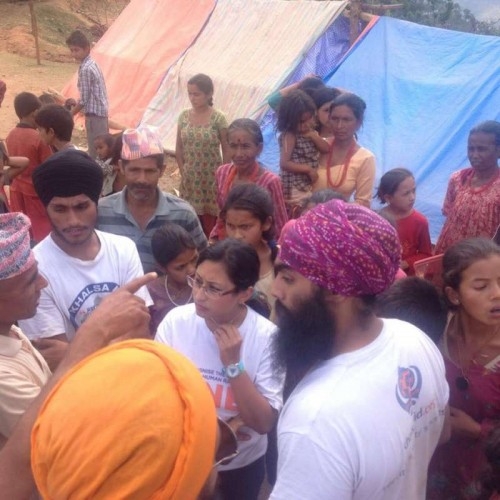
By Vishal Gulati
After rescuing flood victims and helping rebuild homes in Bosnia, British Sikhs are back to help – assisting Nepal to rise again from the debris of three nerve-rattling major earthquakes and many more aftershocks that have killed thousands of people and caused widespread destruction.
They are middle-aged volunteers from the Slough-based charity Khalsa Aid and are helping the people rebuild their homes. They are providing food, shelter and sanitation.
“We have raised 250 shelters till date and the target is to raise an equal number of structures,” charity coordinator Kanwar Singh told in the Nepalese capital.
Within 12 hours of the first quake on the afternoon of April 25, an emergency response team of Khalsa Aid from India’s Punjab reached the Himalayan nation.
“In the next 48 hours we all arrived here from Britain,” Kanwar Singh added.
Jim Winkworth, a builder by profession and volunteer of the charity, is assessing the integrity of the buildings and assisting in the reconstruction of the damaged ones.
“We are raising structures with new material or stuff retrieved from the debris,” Winkworth said.
He said six public shelters were constructed in villages near Kathmandu, where the gravity of damage to the property was high compared to the capital.
“The villages where I am currently focussing in Sindhupalchok are the worst-hit districts. The government relief is yet to reach there,” Winkworth added.
According to him, helping rebuilding homes is the top priority as the monsoon is approaching.
Khalsa Aid, established in 1999 and has provided relief assistance to victims of disasters, wars and other tragic events around the world, has dispatched a cargo plane carrying 10 tonnes of relief material, comprising foodstuff, water purification tablets, hand sensitisers, medicines and tents for the quake victims.
Winkworth had spent months last year along with volunteers of Khalsa Aid helping rebuild houses in Bosnia that were damaged during flash floods.
The charity daily holds community kitchens in and around Kathmandu, providing food to over 8,000 people.
Amanpreet Singh, a volunteer from Punjab who was among the first to reach Nepal, said three Khalsa Aid teams are working round the clock.
One team is arranging food for the displaced, the second is involved in constructing shelters and the third one is assessing the damage in other villages so that they could also be adopted for rehabilitation.
Kanwar Singh, who also worked in Bosnia, said they might extend the project in Nepal.
“After providing emergency shelters, we are going to construct the permanent ones by providing them construction material,” he said.
India-born Ravinder Singh Sidhu, 44, who migrated to Britain in 1981, is the chairman and founder of the humanitarian organisation, which is dependent mainly on donations. He was also here for the cause.
Nepal’s disaster management department head Dharma Raj Pandey said that the first phase of rehabilitation by reaching out to most of the displaced and providing them medical assistance and tents was almost over.
“In the second phase, the topmost priority is to construct temporary structures. For this we need roofing sheets on a much larger scale. We appeal to the international voluntary organisations and foreign ministries to assist us in providing the sheets. There is also a huge shortfall of blankets as winter is approaching,” he said.
Pandey said before the onset of winter, the government is aiming to help the people by providing them financial assistance or free material to get their temporary structures converted into permanent ones.
Over 200 volunteers of the International Federation of Red Cross (IFRC) and Red Crescent Societies are currently working in Nepal.
IFRC secretary general Elhadj As Sy has made another appeal to support the on-going emergency operation in Nepal.
The IFRC has raised 33 million Swiss francs (NRs.3.5 billion) in recent weeks but has expanded its appeal to raise a total of 85 million Swiss Francs to provide support to 700,000 people over the next two years, a statement on IFRC’s website quoting Sy said.
More than 221,000 people are now sheltering under tents or tarpaulins provided by the Red Cross.